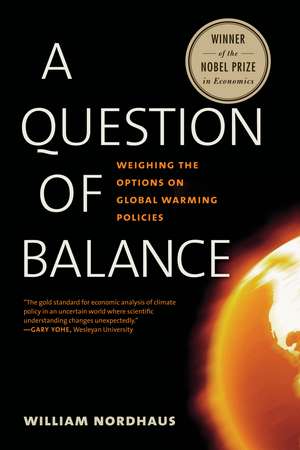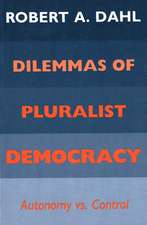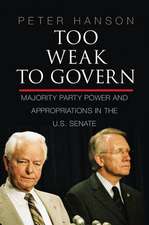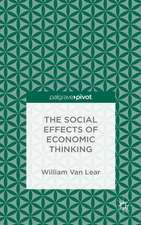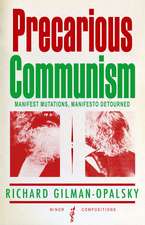A Question of Balance: Weighing the Options on Global Warming Policies
Autor William D. Nordhausen Limba Engleză Paperback – 28 oct 2014
The
2018
Nobel
laureate
for
economics
shows
how
economic
analysis
can
help
us
design
economic
policies
to
address
the
looming
challenges
of
global
warming
As scientific and observational evidence on global warming piles up every day, questions of economic policy in this central environmental topic have taken center stage. But as author and prominent Yale economist William Nordhaus observes, the issues involved in understanding global warming and slowing its harmful effects are complex and cross disciplinary boundaries. For example, ecologists see global warming as a threat to ecosystems, utilities as a debit to their balance sheets, and farmers as a hazard to their livelihoods.
In this important work, William Nordhaus integrates the entire spectrum of economic and scientific research to weigh the costs of reducing emissions against the benefits of reducing the long-run damages from global warming. The book offers one of the most extensive analyses of the economic and environmental dynamics of greenhouse-gas emissions and climate change and provides the tools to evaluate alternative approaches to slowing global warming. The author emphasizes the need to establish effective mechanisms, such as carbon taxes, to harness markets and harmonize the efforts of different countries. This book not only will shape discussion of one the world’s most pressing problems but will provide the rationales and methods for achieving widespread agreement on our next best move in alleviating global warming.
As scientific and observational evidence on global warming piles up every day, questions of economic policy in this central environmental topic have taken center stage. But as author and prominent Yale economist William Nordhaus observes, the issues involved in understanding global warming and slowing its harmful effects are complex and cross disciplinary boundaries. For example, ecologists see global warming as a threat to ecosystems, utilities as a debit to their balance sheets, and farmers as a hazard to their livelihoods.
In this important work, William Nordhaus integrates the entire spectrum of economic and scientific research to weigh the costs of reducing emissions against the benefits of reducing the long-run damages from global warming. The book offers one of the most extensive analyses of the economic and environmental dynamics of greenhouse-gas emissions and climate change and provides the tools to evaluate alternative approaches to slowing global warming. The author emphasizes the need to establish effective mechanisms, such as carbon taxes, to harness markets and harmonize the efforts of different countries. This book not only will shape discussion of one the world’s most pressing problems but will provide the rationales and methods for achieving widespread agreement on our next best move in alleviating global warming.
Preț: 232.91 lei
Nou
Puncte Express: 349
Preț estimativ în valută:
44.57€ • 46.36$ • 36.80£
44.57€ • 46.36$ • 36.80£
Carte disponibilă
Livrare economică 24 martie-07 aprilie
Preluare comenzi: 021 569.72.76
Specificații
ISBN-13: 9780300209396
ISBN-10: 0300209398
Pagini: 256
Ilustrații: 25 b-w illus.
Dimensiuni: 140 x 210 x 18 mm
Greutate: 0.27 kg
Editura: Yale University Press
Colecția Yale University Press
ISBN-10: 0300209398
Pagini: 256
Ilustrații: 25 b-w illus.
Dimensiuni: 140 x 210 x 18 mm
Greutate: 0.27 kg
Editura: Yale University Press
Colecția Yale University Press
Notă biografică
William D. Nordhaus, winner of the 2018 Nobel Prize in Economics and Sterling Professor of Economics at Yale University, is the author of The Climate Casino: Risk, Uncertainty, and Economics for a Warming World. He lives in New Haven, CT.
Descriere
The 2018 Nobel laureate for economics shows how economic analysis can help us design economic policies to address the looming challenges of global warming
As scientific and observational evidence on global warming piles up every day, questions of economic policy in this central environmental topic have taken center stage. But as author and prominent Yale economist William Nordhaus observes, the issues involved in understanding global warming and slowing its harmful effects are complex and cross disciplinary boundaries. For example, ecologists see global warming as a threat to ecosystems, utilities as a debit to their balance sheets, and farmers as a hazard to their livelihoods.
In this important work, William Nordhaus integrates the entire spectrum of economic and scientific research to weigh the costs of reducing emissions against the benefits of reducing the long-run damages from global warming. The book offers one of the most extensive analyses of the economic and environmental dynamics of greenhouse-gas emissions and climate change and provides the tools to evaluate alternative approaches to slowing global warming. The author emphasizes the need to establish effective mechanisms, such as carbon taxes, to harness markets and harmonize the efforts of different countries. This book not only will shape discussion of one the world’s most pressing problems but will provide the rationales and methods for achieving widespread agreement on our next best move in alleviating global warming.
As scientific and observational evidence on global warming piles up every day, questions of economic policy in this central environmental topic have taken center stage. But as author and prominent Yale economist William Nordhaus observes, the issues involved in understanding global warming and slowing its harmful effects are complex and cross disciplinary boundaries. For example, ecologists see global warming as a threat to ecosystems, utilities as a debit to their balance sheets, and farmers as a hazard to their livelihoods.
In this important work, William Nordhaus integrates the entire spectrum of economic and scientific research to weigh the costs of reducing emissions against the benefits of reducing the long-run damages from global warming. The book offers one of the most extensive analyses of the economic and environmental dynamics of greenhouse-gas emissions and climate change and provides the tools to evaluate alternative approaches to slowing global warming. The author emphasizes the need to establish effective mechanisms, such as carbon taxes, to harness markets and harmonize the efforts of different countries. This book not only will shape discussion of one the world’s most pressing problems but will provide the rationales and methods for achieving widespread agreement on our next best move in alleviating global warming.
